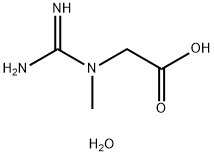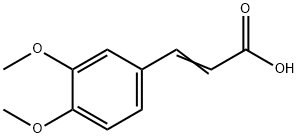
6020-87-7
- Product Name:Creatine monohydrate
- Molecular Formula:C4H9N3O2.H2O
- Purity:99%
- Molecular Weight:
Product Details;
CasNo: 6020-87-7
Molecular Formula: C4H9N3O2.H2O
Appearance: white cryst. powder
|
6020-87-7 Name |
|
|
Name |
Creatine monohydrate |
|
Synonym |
N-GUANYL-N-METHYLGLYCINE;N-GUANYL-N-METHYLGLYCINE, MONOHYDRATE;N-METHYL-N-GUANYLGLYCINE MONOHYDRATE;N-AMIDINOSARCOSINE;N-AMIDINOSARCOSINE HYDRATE;N-AMIDINOSARCOSINE MONOHYDRATE;Glycine, N-(aminoiminomethyl)-N-methyl-, monohydrate;jisuanyisui |
|
6020-87-7 Biological Activity |
|
|
Description |
Creatine monohydrate, an endogenous amino acid derivative, plays an important role in cellular energy, especially in muscle and brain[1]. |
|
Related Catalog |
Research Areas >> Metabolic Disease |
|
Target |
Human Endogenous Metabolite |
|
References |
[1]. Nouioua S, et al. Creatine deficiency syndrome. A treatable myopathy due to arginine-glycine amidinotransferase (AGAT) deficiency. Neuromuscul Disord. 2013 Aug;23(8):670-4. |
|
6020-87-7 Chemical & Physical Properties |
|
|
Melting point |
292 °C (dec.)(lit.) |
|
Molecular Formula |
C4H11N3O3 |
|
Molecular Weight |
149.148 |
|
PSA |
99.64000 |
|
Exact Mass |
149.080048 |
|
Storage condition |
Store at RT. |
|
Water Solubility |
13 g/L (20 ºC) |
|
6020-87-7 Description |
|
Creatine Monohydrate is the monohydrate form of creatine similar or identical to endogenous creatine produced in the liver, kidneys, and pancreas. Pure creatine is a white, tasteless,odorless powder, that is a naturally occurring metabolite found in muscle tissue. Creatine monohydrate is an amino acid produced in the human body that plays a role in replenishing the energy supply to muscle cells.Creatine is usually produced to a purity of 99.5 percent or higher.Until recently, the primary use for creatine was as a laboratory reagent, demand for which was relatively limited. |
|
6020-87-7 Uses |
|
Relevant Products
-
3,4-Dimethoxycinnamic acid
CAS:2316-26-9
-
1-Adamantanamine hydrochloride
CAS:665-66-7








